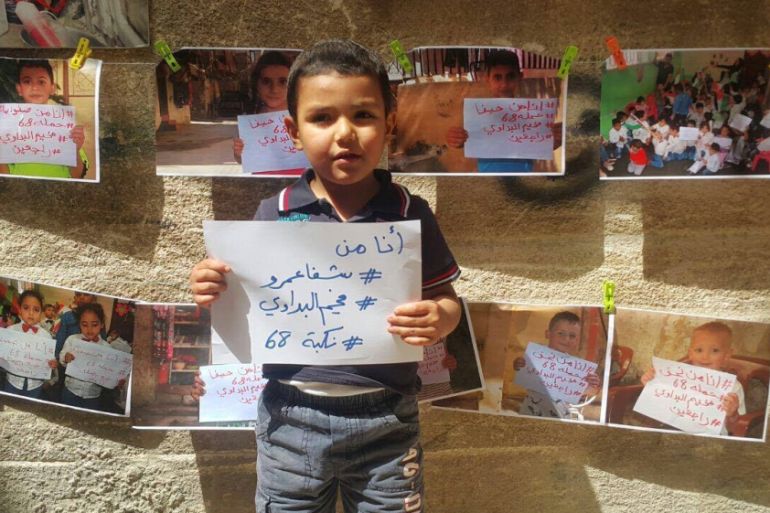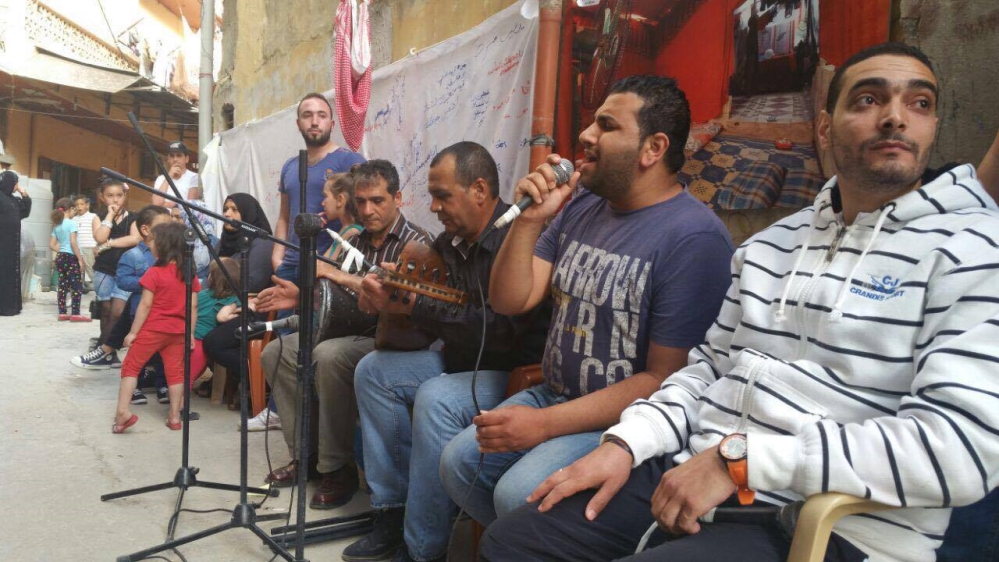‘We are the generation that will return to Palestine’
Young Palestinian refugees across historic Palestine and Lebanon launch a joint campaign to commemorate Nakba day.

Palestinian youth hailing from refugee camps across historic Palestine and Lebanon have launched a joint campaign to commemorate the 68th year since Nakba – or the “catastrophe” that befell the Palestinian people when Israel proclaimed statehood in 1948.
Titled #Campaign68, the initiative is distinctive for its unprecedented level of coordination across camps in the West Bank, Gaza, Jerusalem, the 48 territories and Lebanon, where activities are being held in conjunction with one another.
Keep reading
list of 4 itemsSirens sound for 76th anniversary of Palestinian Nakba
Return to Palestine
Photos: Palestinians mark 76 years of Nakba as new tragedy unfolds in Gaza
Commemorated on May 15 when Israel declared its state, the memory of Nakba is a painful one of displacement, death and the loss of a homeland for Palestinians. At least 750,000 Palestinians were expelled from their homes when more than 400 villages were cleansed of their residents and many more villages destroyed entirely.
The descendants of those expelled Palestinians, which now number five million , are still living in camps across the region and within Palestine itself. “We want to send the message that the camps are the token of the Right of Return. After 68 years, we are still attached to every piece of our land and every house in Palestine,” said Ziad Mekdadi, a Palestinian refugee living in Lebanon and an organiser from the Palestinian Youth Network. “This time, we don’t want to build camps, or drink bitter coffee. We don’t want to give out black flags [to portray grief] any more. This time, we want to say, come everyone, let’s think together. We are the generation that will return to Palestine,” Mekdadi told Al Jazeera.
While events commemorating Nakba are held annually, this year’s events are being spearheaded by Palestinian youth who are taking the reins in affirming their right to return to their homeland and reminding the younger generations of their roots.
![Palestinian children in Shatila refugee camp in the south of Lebanon. The camp hosts more than 9.842 refugees, according to the UN [Ziad Mekdadi, Palestinian Youth Network]](/wp-content/uploads/2016/05/0b7b9e3963494640bb04f0257a8cf6f3_18.jpeg)
According to the UN, about 1.26 million of Gaza’s 1.8 million population are internally displaced persons (IDPs) – hailing mostly from Jaffa southwards. In the West Bank, the number stands at nearly 775,000 Palestinians. Neighbouring Jordan and Lebanon host two million and 450,000 respectively.
”I
differences, will not accept anything other than Palestine as our homeland and Jerusalem as our capital.”]
Activists have also organised live video sessions to connect refugees with the towns and villages their families fled, among other things.
Hazem Abu Helal, a political activist living in Ramallah who is also working to coordinate campaign activities in the West Bank, says taking these steps “confirms the unity of the youth against all political solutions that seek to liquidate the cause of the refugees.
“Any kind of solution that may be thought of is senseless and worthless without the right of return.”
The civil war in Syria since 2011 has forced about 110,000 Palestinian refugees in that country to move out to neighbouring countries and up to 280,000 are currently displaced within Syria.
The majority of the camps are run by the United Nations Relief and Works Agency (UNRWA) for Palestine Refugees in the Near East.
On several occasions, activists and refugees protested against budget cuts . Palestinian refugees are staging protests in front of the agency’s offices in Tulkarem, east of Nablus and Jenin. “We need to work on improving the conditions of the people, and then focus on the land. In the camps, we experience the worst kind of discrimination in the country – from rights to education, to work opportunities. Most Palestinian graduates are without work,” said Mekdadi.
“People are done with UNRWA’s cutbacks. We want to develop our camps – not to say that we have forgotten the right of return, but, for the man who wants to feed his kids, we want to be able to provide him with a better life so that there is sufficient time to think about a systematic way of returning to Palestine,” he added.
After the influx of Palestinian refugees into Arab countries in 1948, Jordan was the only Arab nation to integrate large numbers of Palestinians and grant them full citizenship, mainly because it annexed the West Bank as part of Jordan. Lebanon, on the other hand, was reluctant to accept them. They are barred from working in as many as 20 professions and are stripped of many rights.
 |
| According to the UN, Lebanon has the highest percentage of Palestinian refugees living in poverty [Ziad Mekdadi, Palestinian Youth Network] |
|
|
Salma Ali Rushdan, 23, a participant in the campaign, fled Syria’s Yarmouk refugee camp to find refuge in Lebanon’s Burj al-Shamali camp in 2012 after clashes erupted between the Syrian army and rebel groups in Yarmouk camp.
Rushdan says there is a consensus among Palestinians on rejecting any notion of “nationalisation” into Lebanon’s society and moving on with life. “I am certain that the Palestinian people, despite [political] differences, will not accept anything other than Palestine as our homeland and Jerusalem as our capital.”
Although Israel bans Palestinian refugees from returning home or even visiting in many cases, Mekdadi was lucky enough to see Palestine last year through an invitation from the Palestinian Ministry of Culture to speak about Palestinians in the diaspora. He says people still have hope of returning to Palestine.
“When I went back [to Lebanon], I told everyone that our land is beautiful,” said Mekdadi. “And even if we have to live in the middle of the desert in the caves of Jericho – it will be much better than living in Lebanon.”